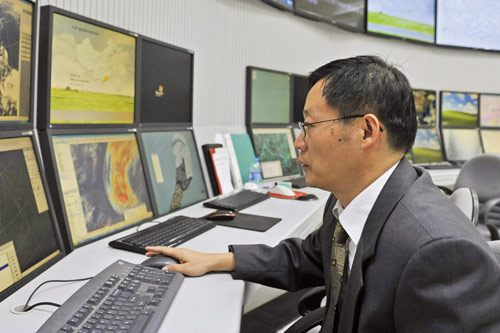Come sunshine or rain
 |
|
He Lifu monitors a wall of screens with maps and data at the National Meteorological Center. Wei Xiaohao / China Daily |
Beijingers were never so hung up with checking weather conditions before the devastating floods in July, which claimed 79 lives.
But keeping track of the weather is part of a daily, or even hourly routine, for some.
Such timely and often accurate information is churned out by weather forecasters like He Lifu, who monitors a wall of screens with maps and data of every conceivable type from every corner of the country.
The chief weather forecaster of the National Meteorological Center starts his day at 6 am, analyzing a torrent of information generated by computers before releasing the national weather report before 8 am.
"Cold air movement is expected to be active across the country in September especially in areas such as Beijing, which are entering autumn," he says, pointing at one of the screens in front of him.
He says he made many wrong forecasts in the 1980s when the country did not have advanced weather forecast technology.
But weather predictions have improved with the construction of thousands of meteorological stations and high technology systems nationwide, and such accurate projections play an important role when planning big events.
Recalling his greatest moment in 2008, He says his team successfully forecasted the weather conditions on Mount Qomolangma for the Beijing Olympic torch relay.
The assignment was something new for He and his team because none of them knew much about mountain climates and there was no ready meteorological data. Thus, He and his team went up the mountain to live and gather weather information for 74 days.
"I knew that once I said the weather was OK for mountain climbing, the torch relay would start. We could not make any mistake," he says, adding that not only had they to consider the life of the torchbearer, they had the country's pride in their hands.
The 74 days were a nightmare for He, who suffered from altitude sickness and extreme cold.
"The place we lived in was about 5,500 meters above sea level. Due to altitude sickness, we couldn't eat. Sometimes, we couldn't even consume as little as a package of instant noodles a day," he remembers.
On May 5, 2008, He and his team predicted that the weather would be suitable for mountain climbing from May 8 to 9 and three days later, the Olympic flame scaled the highest point on Earth on May 8.
"It was the first time in my weather forecast career that I felt so relieved after an accurate forecast," he says.
He attended almost all the weather forecasts for the nation's important events including the National Day Parade celebrating the 60th anniversary of the founding of the People's Republic of China, and natural disasters such as typhoons and rainstorms.
"For such big events, staring at the screens all day is common for meteorologists," he says. He reveals that he has not celebrated his son's birthday in the past 16 years.
"With the progress of the country, natural disasters bring economic losses and casualties to the country. That's why accurate weather reports are extremely important," he says.
To most laymen, the weather decides their daily activities such as whether to stay home or go out with their friends and family.
For car owner Lu Yao, the weather determines how he gets to work. If the weatherman predicts rain, he will leave his car at home and take the bus to work.
Although He has been a weatherman for 27 years, he cannot guarantee 100 percent accuracy.
"It's unpredictable, like guessing heads or tails when you toss a coin. Meteorologists can only tell the chances of precipitation or storms by calculating as many factors as possible which influence the weather system."
wangqian@chinadaily.com.cn
















